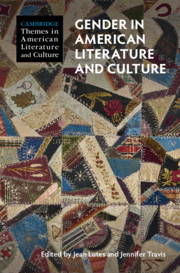Book contents
- Gender in American Literature and Culture
- Cambridge Themes in American Literature and Culture
- Gender in American Literature and Culture
- Copyright page
- Contents
- Contributors
- Acknowledgments
- Introduction
- Part I Intimacies
- Part II Aggressions
- Chapter 8 Sexual Violence and Indigenous Women
- Chapter 9 Intergenerational Memory and the Making of Indigenous Literary Kinships
- Chapter 10 US Women Writers, Sexual Violence, and Narrative Resistance
- Chapter 11 Gender, Violence, and Accountability in Contemporary Queer Latina Writing
- Chapter 12 The Literature of Racial Uplift and White Feminist Failure
- Chapter 13 Black Male Studies and Contemporary African American Writing
- Chapter 14 Representations of White Masculinity in Veteran-Authored Iraq War Fiction
- Part III New Directions
- Bibliography
- Index
Chapter 8 - Sexual Violence and Indigenous Women
Rereading the Archive of Catharine Brown (Cherokee)
from Part II - Aggressions
Published online by Cambridge University Press: 01 April 2021
- Gender in American Literature and Culture
- Cambridge Themes in American Literature and Culture
- Gender in American Literature and Culture
- Copyright page
- Contents
- Contributors
- Acknowledgments
- Introduction
- Part I Intimacies
- Part II Aggressions
- Chapter 8 Sexual Violence and Indigenous Women
- Chapter 9 Intergenerational Memory and the Making of Indigenous Literary Kinships
- Chapter 10 US Women Writers, Sexual Violence, and Narrative Resistance
- Chapter 11 Gender, Violence, and Accountability in Contemporary Queer Latina Writing
- Chapter 12 The Literature of Racial Uplift and White Feminist Failure
- Chapter 13 Black Male Studies and Contemporary African American Writing
- Chapter 14 Representations of White Masculinity in Veteran-Authored Iraq War Fiction
- Part III New Directions
- Bibliography
- Index
Summary
This chapter examines how a U.S. soldier’s sexual harassment prompted the enrollment of Kā tý Brown, also known as Catharine Brown, at a mission school in the Cherokee Nation in 1817. Viewed through Indigenous feminists’ theorizations of the role of sexual violence in settler colonialism, archival materials enable new understandings of the significance of the life and writings of Brown, one of the earliest Native American women to publish self-authored writings. Brown’s strategic and agential removal of herself from her harasser’s proximity became a foundational act in her development as a Cherokee leader over the next several years as she put her literacy to service in the cause of sovereignty. More broadly, the essay interrogates how a lack of scholarly attention to Indigenous women’s experiences of sexual violence has affected scholarly conclusions about Cherokee-white relations in the pre-Removal period and demonstrates how Indigenous feminist theorizations of colonial sexual violence must be put in dialogue with the documentary record in archives.
Keywords
- Type
- Chapter
- Information
- Gender in American Literature and Culture , pp. 127 - 141Publisher: Cambridge University PressPrint publication year: 2021

